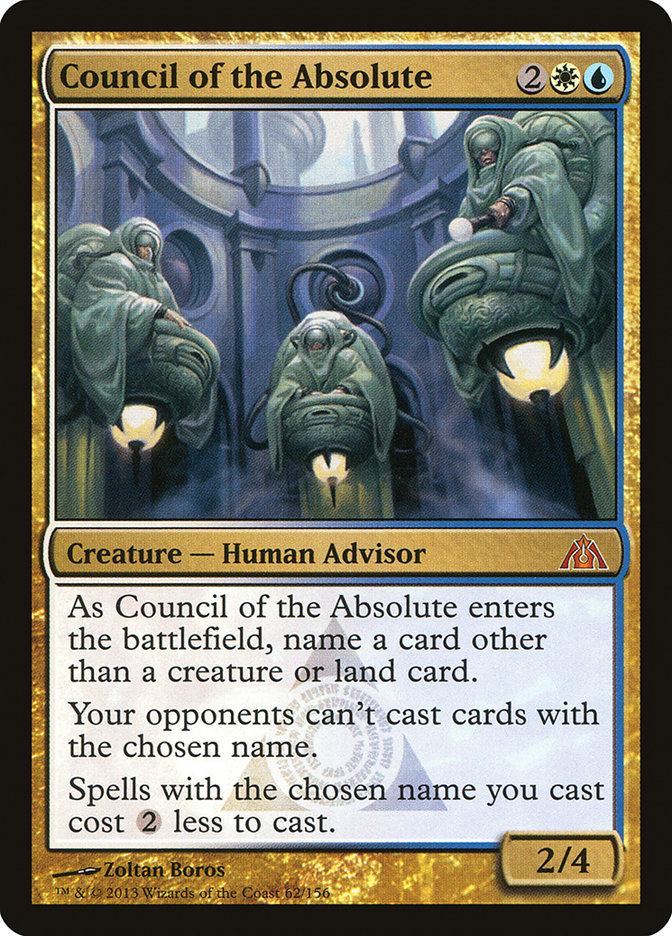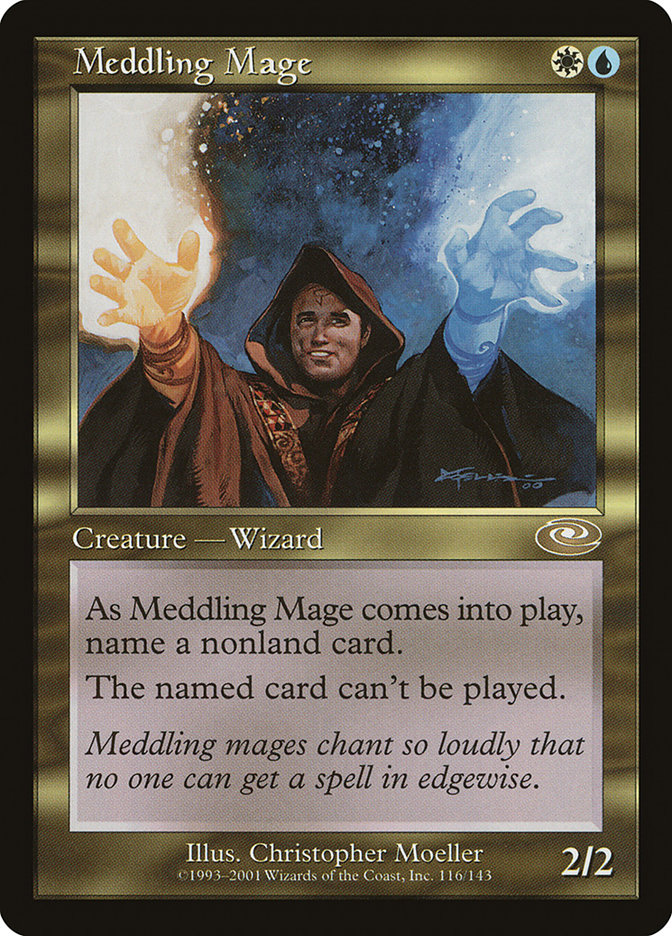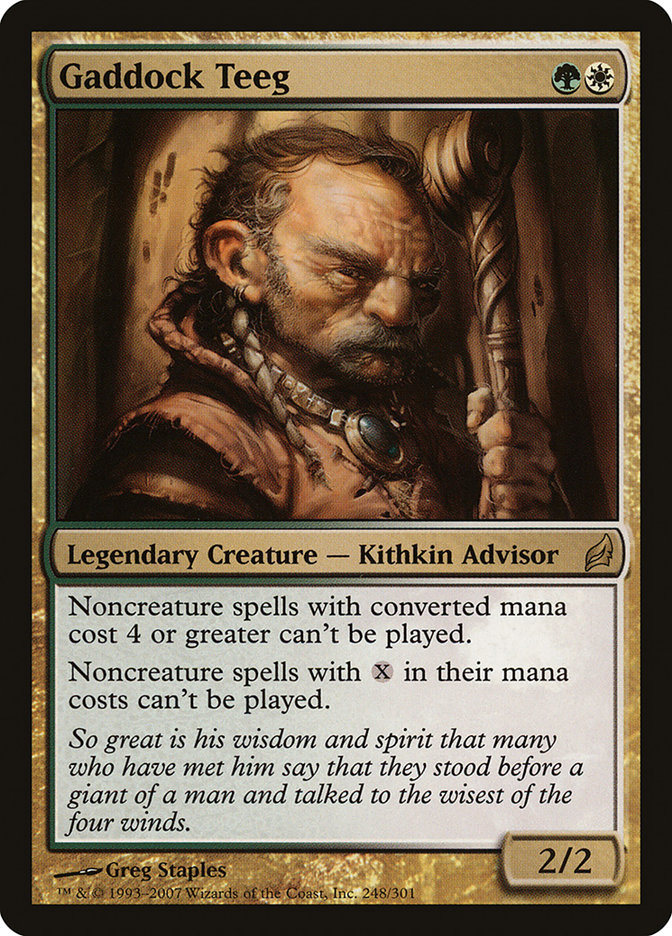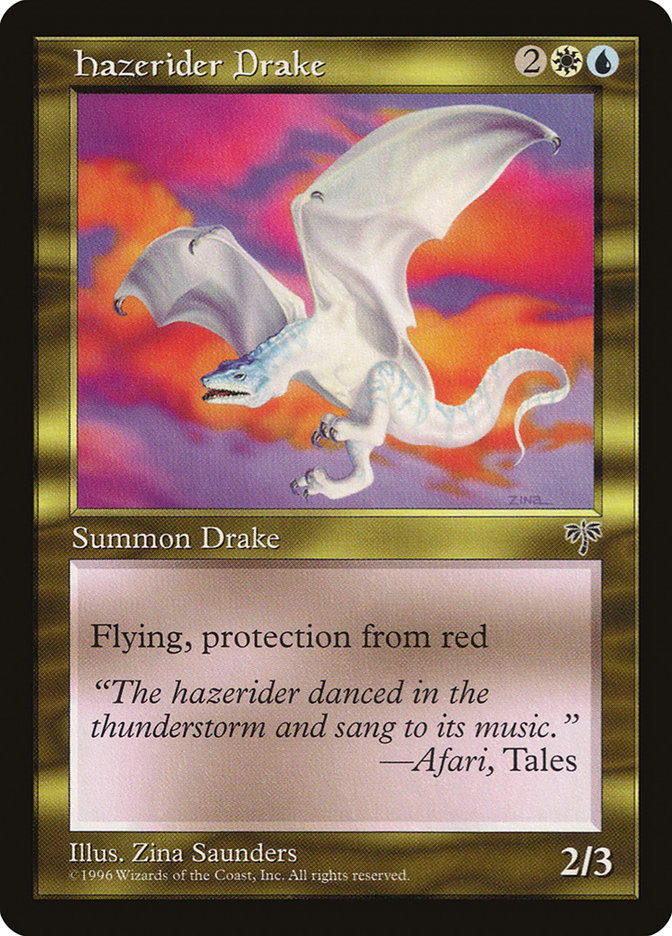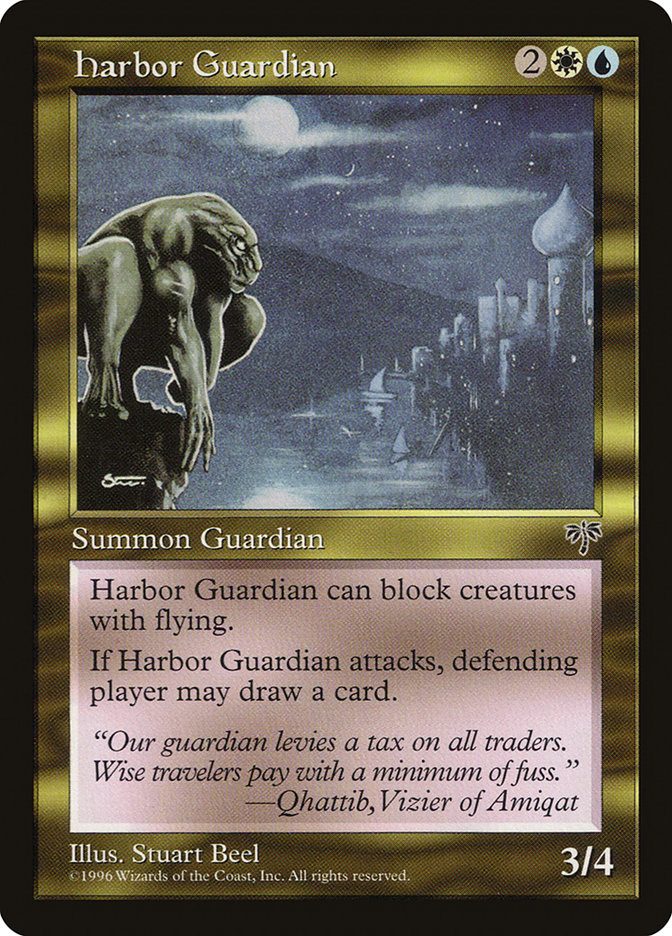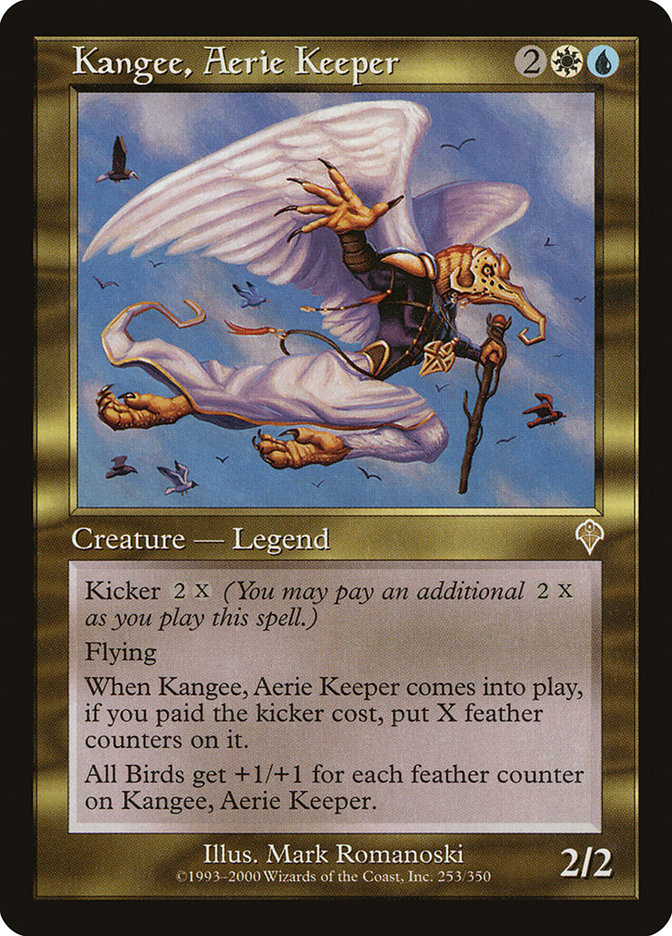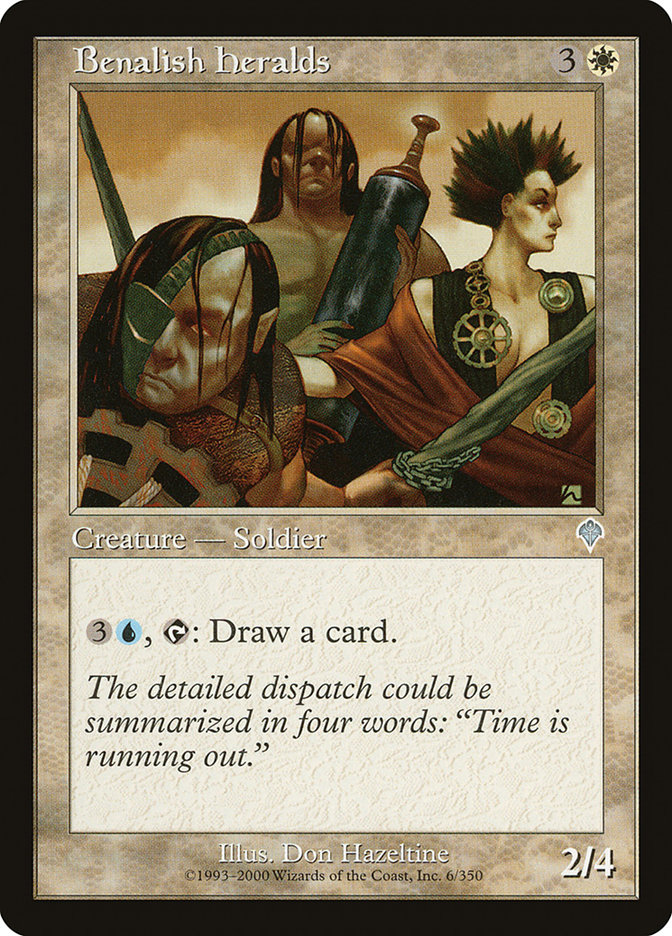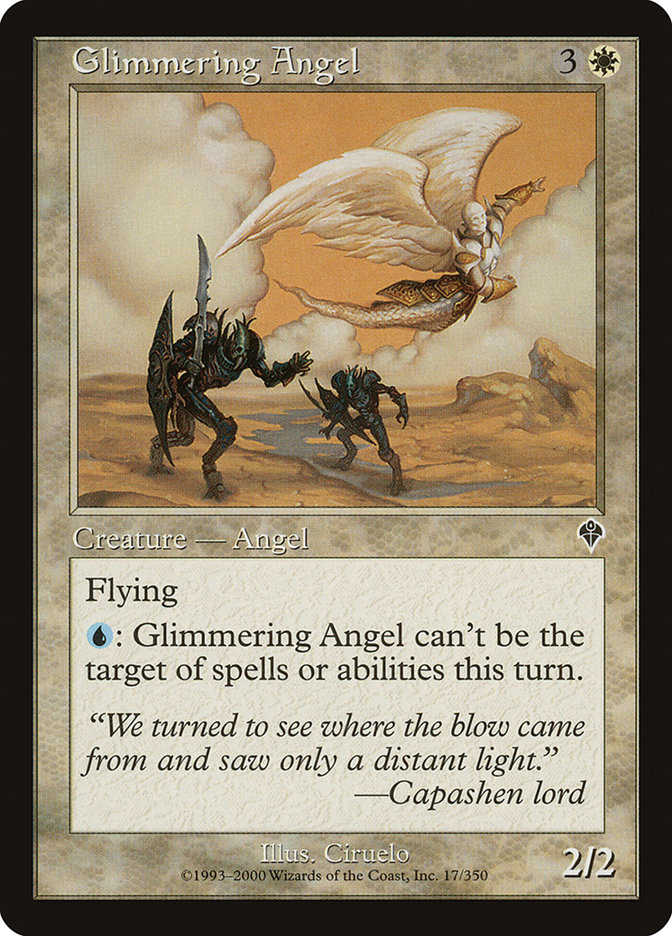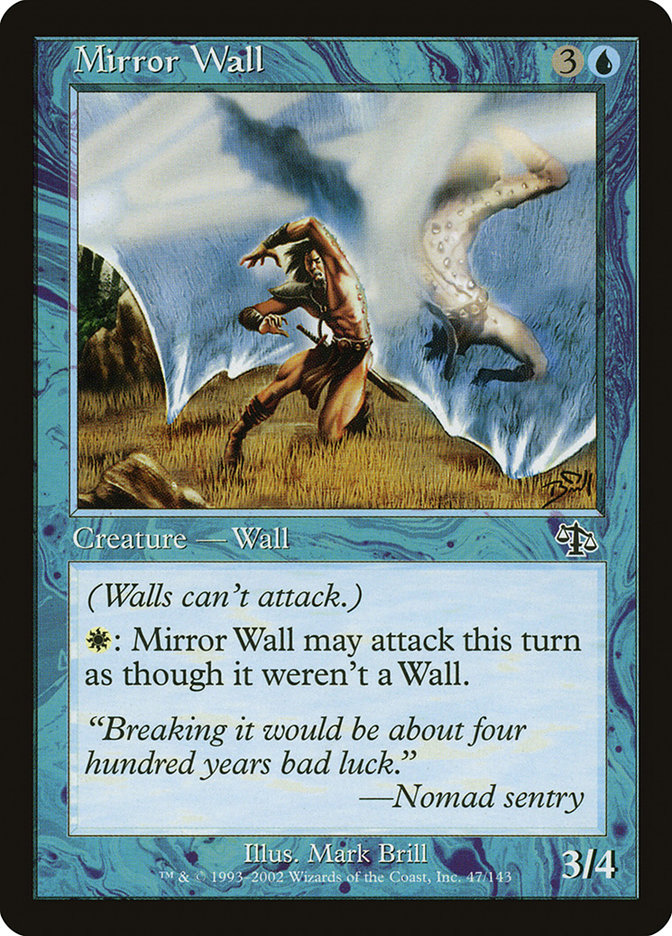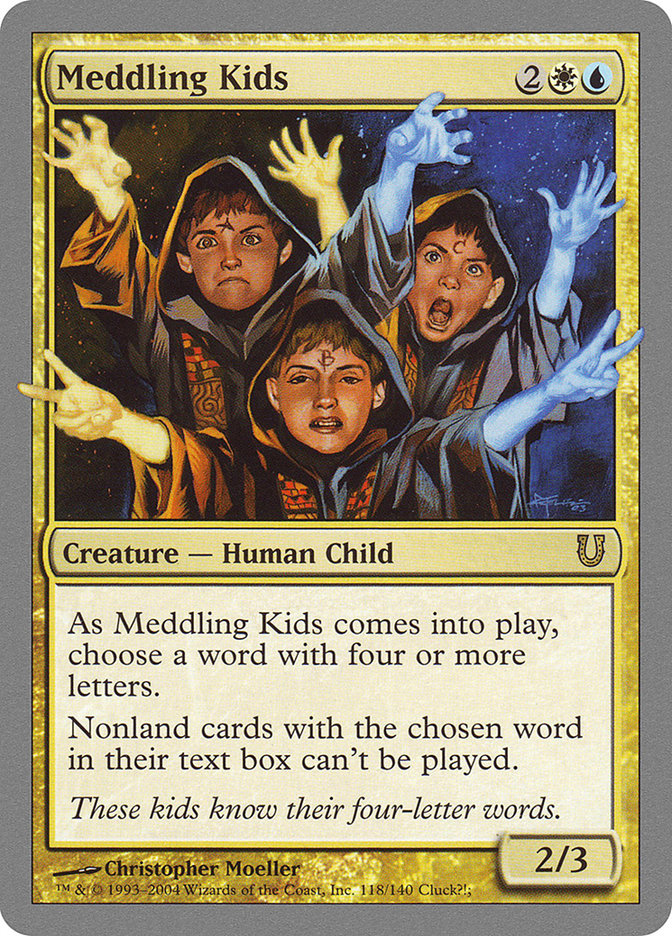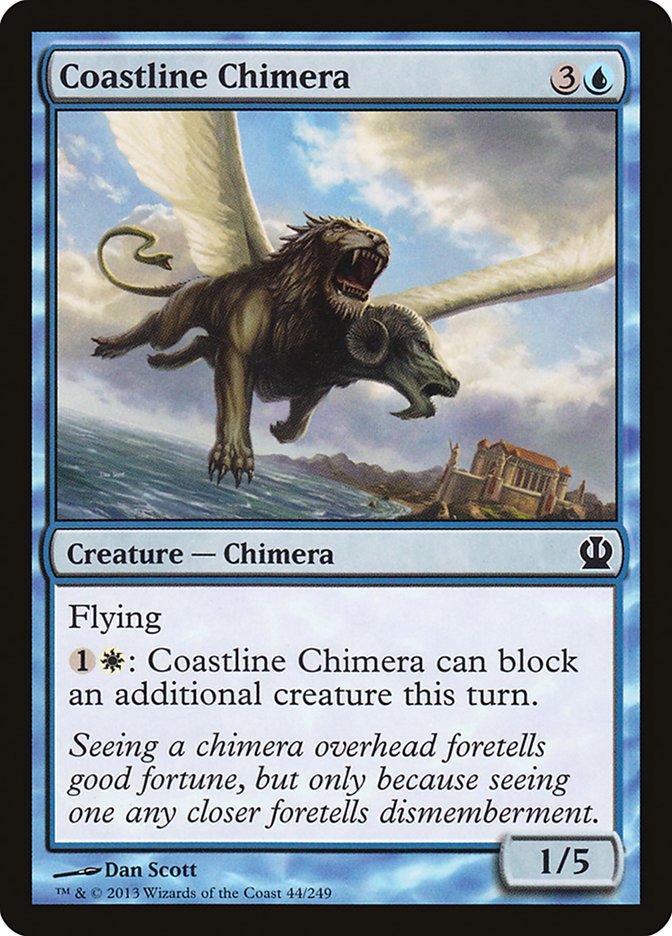Concilio de los Absolutos Carta MTG
| El coste de maná | |
| Costo de maná convertido | 4 |
| Rareza | Mítica |
| Tipo | Criatura — Consejero humano |
| Liberado | 2013-05-03 |
| Coleccione símbolo | |
| Coleccione nombre | Dragon's Maze |
| Coleccione código | DGM |
| Fuerza | 2 |
| Tenacidad | 4 |
| Número | 62 |
| Frame | 2003 |
| Disposición | Normal |
| Border | Negra |
| Ilustrado por | Zoltan Boros |
Texto de la carta
Cuando el Concilio de los Absolutos entre al campo de batalla, nombra una carta que no sea de criatura ni de tierra. Tus oponentes no pueden lanzar cartas con el nombre elegido. Los hechizos que lances con el nombre elegido te cuestan {2} menos.
Cartas Similares
Cuando se evalúa el matiz estratégico de Council of the Absolute en Magic: The Gathering, uno podría encontrar similitudes con otras cartas que ejercen influencia sobre las estrategias de los oponentes. Meddling Mage es una carta que comparte un parentesco con Council of the Absolute, ya que ambas entidades permiten a un jugador nombrar una carta y evitar que un oponente lance hechizos con ese nombre. Sin embargo, Council of the Absolute se destaca con su habilidad adicional de reducir el coste de los hechizos que el controlador lanza con el nombre elegido, tejiendo una capa interesante de ventaja para el controlador.
Gaddock Teeg tiene una esfera de influencia en un ámbito similar al de Council of the Absolute. Aunque no permite nombrar una carta específica, restringe el lanzamiento de todos los hechizos con costes de maná elevados o efectos poderosos, es decir aquellos con “X” en su coste de maná o aquellos que son hechizos no criatura con un coste de maná convertido de cuatro o más. Este paraguas de control puede ser tanto una ventaja como una restricción dependiendo del enfrentamiento.
En esencia, mientras cartas como Meddling Mage y Gaddock Teeg ofrecen medidas preventivas amplias contra las estrategias de los oponentes, Council of the Absolute permite a los jugadores de MTG adaptar su impacto de control mientras potencialmente aceleran su propio plan de juego, posicionándola como una herramienta única en el arquetipo de control.
Cartas similares a Concilio de los Absolutos por color, tipo y coste de maná
Aspectos positivos de la carta
Ventaja de cartas: El Consejo del Absoluto ofrece previsión estratégica al permitirte nombrar una carta al entrar al campo de batalla, previniendo efectivamente que tus oponentes lancen esa carta. Esto puede ser una ventaja crítica al negar piezas clave de la estrategia del oponente y mantener la superioridad en la utilidad de las cartas.
Aceleración de recursos: Aunque no produce directamente mana o fichas, esta carta puede llevar indirectamente a la aceleración de recursos al proteger tu posición y avanzar tu estado de juego mientras interrumpes los planes de tu oponente. Esto podría permitirte proteger tus recursos e invertirlos de manera más eficiente con el tiempo.
Velocidad instantánea: Si bien el Consejo del Absoluto en sí no es un instantáneo, su capacidad para dictar el ritmo del juego crea un entorno donde puedes jugar de manera más segura hechizos instantáneos y otros hechizos que responden rápidamente. Al controlar los hechizos que tus oponentes pueden lanzar, aumentas la efectividad de tus interacciones de velocidad instantánea.
Aspectos negativos de la carta
Requisito de descarte: Aunque el Consejo del Absoluto presenta un diseño intrigante para influir en los hechizos de tu oponente, su utilidad tiene un costo. Sin un desencadenante de descarte, podría parecer libre de esta desventaja, sin embargo, su verdadero costo puede surgir de formas menos directas. Jugar esta carta de manera efectiva a menudo requiere mantenerla, descartando efectivamente otras oportunidades para impactar en el tablero de juego o avanzar tu posición.
Costo específico de mana: Esta criatura mística exige un arreglo de mana especializado, necesitando tanto mana blanco como azul para ser jugada. Este requisito inclina a los constructores de mazos hacia esquemas azorios y puede no encajar bien con una estrategia de color más amplia. Los jugadores que buscan incluir el Consejo del Absoluto en un mazo podrían enfrentar limitaciones debido a sus estrictas necesidades de mana.
Costo de mana comparativamente alto: La carta se presenta con un costo de lanzamiento que puede parecer elevado por su impacto inicial. Con cuatro manas, específicamente dos genéricos, uno blanco y uno azul, los jugadores podrían cuestionar la rentabilidad de incluir esta carta particular sobre otras con efectos de presencia en el tablero más inmediatos o potentes.
Razones para incluir el Consejo del Absoluto en tu colección
Versatilidad: El Consejo del Absoluto te permite declarar el nombre de cualquier carta que no sea tierra al entrar, impidiendo a tus oponentes lanzar la carta nombrada. Esta característica ofrece opciones de control estratégico, adaptables a múltiples enfrentamientos y adaptables a varias construcciones de mazos.
Potencial de combo: Al dictar las opciones de juego de tus oponentes, esta carta abre oportunidades para jugadas de combo. Complementa eficientemente estrategias destinadas a suprimir a los oponentes mientras establece tus propias condiciones de victoria en el juego sin interferencias.
Relevancia meta: En un entorno competitivo, donde ciertas cartas o estrategias son predominantes, el Consejo del Absoluto puede ser una adición táctica. Perturba componentes clave de mazos populares, haciendo que tu colección sea resistente y estratégicamente diversa contra el meta actual.
Cómo vencerlo
El Consejo del Absoluto del plano de Rávnica es una carta única que te permite determinar de forma flexible qué hechizo tendrán dificultades para lanzar tus oponentes. Al entrar en el campo de batalla, esta intrigante carta te invita a nombrar otra carta. Mientras el Consejo del Absoluto permanezca en el campo de batalla, tu oponente no puede lanzar la carta nombrada, y el costo de lanzar la carta identificada por tu mano se reduce. Esta doble capacidad puede crear una ventaja táctica al obstaculizar selectivamente la estrategia de tu oponente mientras aceleras la tuya.
Al enfrentarte al Consejo del Absoluto, la versatilidad en tu mazo es clave. Confiar en una variedad diversa de hechizos en lugar de una sola carta poderosa puede evadir la habilidad restrictiva del Consejo. Los hechizos de eliminación que puedan apuntar y eliminar criaturas son herramientas esenciales para desarmar la influencia del Consejo en tu juego. Del mismo modo, los contrahechizos son una defensa firme, listos para interceptar al Consejo cuando intenta imponer su dominio en el campo de batalla. Considerando la debilidad del Consejo contra amenazas múltiples, el camino para superar esta carta radica en crear una estrategia rica en opciones y rápida en capacidad de respuesta.
En última instancia, aunque el Consejo del Absoluto puede dictar el flujo del juego con su declaración autoritaria, un mazo bien construido repleto de soluciones adaptables ciertamente puede anular su decreto.
Donde comprar
Si estás buscando comprar una carta MTG Concilio de los Absolutos de un coleccione específico como Dragon's Maze, existen varias opciones confiables que debes considerar. Una de las fuentes principales es tu tienda de juegos local, donde a menudo puedes encontrar paquetes de refuerzo, cartas individuales y mazos preconstruidos de colecciones actuales y pasadas. A menudo ofrecen el beneficio adicional de una comunidad donde puedes intercambiar con otros jugadores.
Para un inventario más amplio, particularmente de colecciones más antiguos, mercados en línea como TCGPlayer, Card Kingdom y Card Market ofrecen amplias selecciones y te permiten buscar cartas de colecciones específicos. Las plataformas de comercio electrónico más grandes como eBay y Amazon también tienen listados de varios vendedores, lo que puede ser un buen lugar para buscar productos sellados y hallazgos raros.
Además, el sitio oficial de Magic suele tener un localizador de tiendas y listas de minoristas para encontrar Wizards of the Productos con licencia costera. Recuerde comprobar la autenticidad y el estado de las cartas al comprarlas, especialmente a vendedores individuales en mercados más grandes.
A continuación se muestra una lista de algunos sitios web de tiendas donde puede comprar las Concilio de los Absolutos y otras cartas MTG:
 COMPRAR
COMPRAR BurnMana es un socio oficial de TCGPlayer
- eBay
- Card Kingdom
- Card Market
- Star City Games
- CoolStuffInc
- MTG Mint Card
- Hareruya
- Troll and Toad
- ABU Games
- Card Hoarder Magic Online
- MTGO Traders Magic Online
Ver productos MTG
Legalidades
Formatos de Magic the Gathering donde Concilio de los Absolutos tiene restricciones
| Formato | Legalidad |
|---|---|
| Commander | Legal |
| Legacy | Legal |
| Modern | Legal |
| Oathbreaker | Legal |
| Vintage | Legal |
| Duel | Legal |
| Pioneer | Legal |
| Penny | Legal |
Reglas e información
La guía de referencia para las reglas de las cartas Concilio de los Absolutos de Magic: The Gathering proporciona las reglas oficiales, las erratas emitidas, así como un registro de todas las modificaciones funcionales que se han producido.
| Fecha | Texto |
|---|---|
| 15/04/2013 | Si un hechizo con el nombre elegido incluye un mana genérico en su coste de lanzamiento, ese coste se reducirá en . |
| 15/04/2013 | Si existen costos adicionales para lanzar el hechizo, como costos de incremento, aplica esos aumentos antes de aplicar las reducciones de costos. |
| 15/04/2013 | Si nombras la mitad de una carta dividida con fusión, y luego lanzas ambas mitades, la reducción de coste se aplicará al coste total del hechizo. Esto es cierto incluso si la mitad con el nombre elegido requiere solo mana de color para ser lanzada. |
| 15/04/2013 | La última habilidad puede reducir costos alternativos como costos de sobrecarga. |
| 15/04/2013 | La última habilidad no puede reducir el requisito de mana de color de un hechizo. |
| 15/04/2013 | Puedes nombrar una mitad de una carta dividida, pero no ambas. Si nombras una mitad de una carta dividida, tus oponentes pueden lanzar la otra mitad. Si esa carta dividida tiene fusión, tus oponentes no pueden lanzar esa carta como una carta dividida fusionada. |
